

Societal Stressors: 'Social Stress in the Workplace' As organizations experience budget reductions, cutbacks, and workforce reduction, it is easy to understand that workplaces can be stressful.
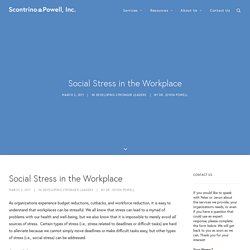
We all know that stress can lead to a myriad of problems with our health and well-being, but we also know that it is impossible to merely avoid all sources of stress. Certain types of stress (i.e., stress related to deadlines or difficult tasks) are hard to alleviate because we cannot simply move deadlines or make difficult tasks easy, but other types of stress (i.e., social stress) can be addressed. Social Stress Social stressors are defined as behaviors and situations, social in nature, that are related to physical and psychological strain.
Examples of social stressors include: verbal aggression from customers or superiors co-worker conflict negative group environments organizational politics unfair treatment Reducing Social Stress For leaders: avoid feelings of unfair/unjust treatment by being aware of your interactions with employees. Burnout: 'Facing The Damage of 'Chronic Workplace Stress' In a world where it seems as though the pressure to perform is always on, more and more people are admitting to burnout at work.
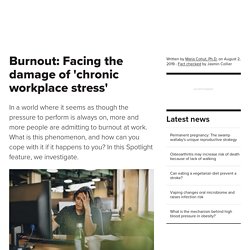
What is this phenomenon, and how can you cope with it if it happens to you? In this Spotlight feature, we investigate. In May 2019, the World Health Organization (WHO) formally recognized burnout as an “occupational phenomenon.” Their decision came after years of hearing people talk about it, trying understand why it affected them, and attempting to identify what they could have done to cope with it. Recently, a Gallup study of around 7,500 full time workers found that 23% were often in “burnout mode.” Although the WHO do not yet recognize burnout as a medical condition, some researchers call it “an occupational disease.” According to the same researchers, some of the occupations most at risk of burnout are linked to professions that encounter high levels of stress, including healthcare, social work, police work, teaching, and customer services.
Diggory agreed. Compassion Fatigue. Compassion fatigue, also known as second-hand shock and secondary stress reaction, describes a type of stress that results from helping or wanting to help those who are traumatized or under significant emotional duress.
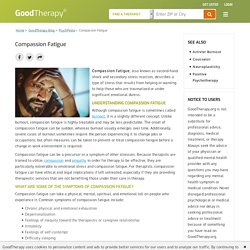
Understanding Compassion Fatigue Although compassion fatigue is sometimes called burnout, it is a slightly different concept. Unlike burnout, compassion fatigue is highly treatable and may be less predictable. The onset of compassion fatigue can be sudden, whereas burnout usually emerges over time. Additionally, severe cases of burnout sometimes require the person experiencing it to change jobs or occupations, but often measures can be taken to prevent or treat compassion fatigue before a change in work environment is required. Compassion fatigue can be a precursor or a symptom of other stressors. Major Life Events: Life's Most Stressful Events; The Holmes and Rahe Stress Scale. The Holmes And Rahe Stress Scale is often used by doctors to find this answer: Can the most stressful life events predict future illness?
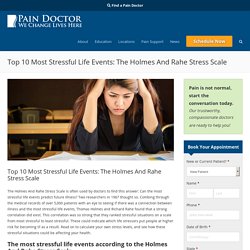
Two researchers in 1967 thought so. Combing through the medical records of over 5,000 patients with an eye to seeing if there was a connection between illness and the most stressful life events, Thomas Holmes and Richard Rahe found that a strong correlation did exist. This correlation was so strong that they ranked stressful situations on a scale from most stressful to least stressful.
These could indicate which life stressors put people at higher risk for becoming ill as a result. Read on to calculate your own stress levels, and see how these stressful situations could be affecting your health. The most stressful life events according to the Holmes And Rahe Stress Scale These results were published as the Social Readjustment Rating Scale (SRRS), more commonly known as the Holmes and Rahe Stress Scale.
Top 10 most stressful life events 1. 2. 3. 4. 5. 6. Daily Hassles. We become stressed for a number of reasons and there's a general consensus that major events in our life contribute to this.
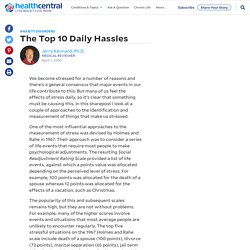
But many of us feel the effects of stress daily, so it's clear that something must be causing this. In this sharepost I look at a couple of approaches to the identification and measurement of things that make us stressed. One of the most influential approaches to the measurement of stress was devised by Holmes and Rahe in 1967. Their approach was to consider a series of life events that require most people to make psychological adjustments.